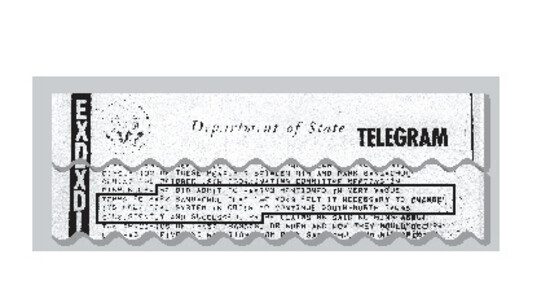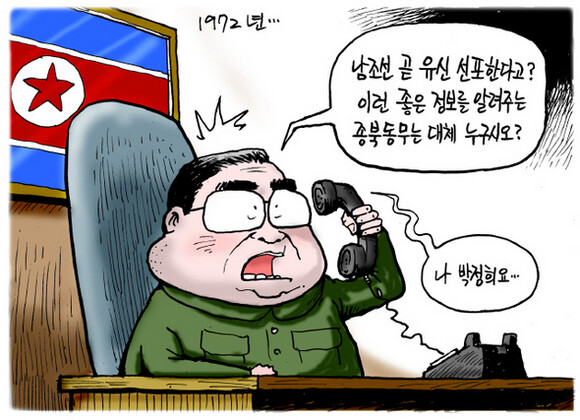hankyoreh
Links to other country sites 다른 나라 사이트 링크
Documents show Park Chung-hee informed NK of Yushin in advance

By Kim Jong-cheol, political correspondent
In attempting to justify its Yushin military coup, the Park Chung-hee regime explained that it was needed to strengthen national security. In his declaration of emergency martial law on Oct. 17, 1972 - almost exactly forty years ago - Park said that “major changes are afoot in the balance of power for the major countries around the Korean Peninsula, and this is expected to have a potentially dangerous impact on South Korea’s security.”
His daughter Geun-hye, who took on the role of First Lady during the Yushin years after her mother’s assassination in 1974, voiced similar beliefs, writing in her diary on Oct. 28, 1981, that “we might well have become fodder for the Communist Party were it not for Yushin.”
Now a presidential candidate for the New Frontier Party, Park Geun-hye recently made a formal apology for the Yushin system and the 1961 coup that put her father in power, saying they “resulted in Constitutional values being compromised and had the effect of delaying the Republic of Korea’s political development.”
But the Park Chung-hee administration actually notified authorities in Pyongyang of the content of the Yushin system twice. Evidence of this surfaced in confidential cables sent home by the US Embassy in Seoul, as well as diplomatic papers from the socialist countries of Eastern Europe.
According to a classified “secret” cable sent by the US embassy to the State Department on Oct. 31, 1972, then-Korean Central Intelligence Agency chief Lee Hu-rak had met on the 12th of that month with North Korean deputy prime minister Pak Song-chol and told him the South Korean government believed it necessary to change the political system to continuously and successfully maintain inter-Korean dialogue.
The cable went on to say that Jeong Hong-jin, the South’s working-level representative for the inter-Korean coordinating committee, met his North Korean counterpart Kim Dok-hyon on Oct. 16 - one day before the martial law declaration - to give a concrete notification.
Meanwhile, North Korea-related diplomatic documents from East Germany, Romania, and Bulgaria, which were declassified in 2009, reported South-North Coordinating Committee Lee as indicating in a message to his counterpart Kim Yong-ju (Kim Il-sung’s younger brother) that Park planned to “make an important announcement on [October] 17th that North Korea should listen to attentively” (from a document dated Oct. 16) and “establish a legal basis for dialogue through revisions to the Constitution” (from a document dated Oct. 18).
Yonsei University professor Park Myung-lim, who uncovered the State Department document, said on Oct. 17 that the documents “demonstrate the fact that while the Park outwardly talked about stepping up national security to prevent a Communist takeover, in reality he was having secret communications with North Korea and building the Yushin system as a means to stay in power indefinitely.”
Indeed, North Korea established its “monolithic system” of rule by Kim Il-sung in response to Seoul’s Yushin system. As it happens, both the Yushin Constitution and North Korea’s Socialist Constitution were enacted on the same day: Dec. 27, 1972.

Please direct questions or comments to [english@hani.co.kr]

Editorial・opinion
![[Editorial] Does Yoon think the Korean public is wrong? [Editorial] Does Yoon think the Korean public is wrong?](https://flexible.img.hani.co.kr/flexible/normal/500/300/imgdb/original/2024/0417/8517133419684774.jpg) [Editorial] Does Yoon think the Korean public is wrong?
[Editorial] Does Yoon think the Korean public is wrong?![[Editorial] As it bolsters its alliance with US, Japan must be accountable for past [Editorial] As it bolsters its alliance with US, Japan must be accountable for past](https://flexible.img.hani.co.kr/flexible/normal/500/300/imgdb/original/2024/0417/6817133413968321.jpg) [Editorial] As it bolsters its alliance with US, Japan must be accountable for past
[Editorial] As it bolsters its alliance with US, Japan must be accountable for past- [Guest essay] Amending the Constitution is Yoon’s key to leaving office in public’s good graces
- [Editorial] 10 years on, lessons of Sewol tragedy must never be forgotten
- [Column] A death blow to Korea’s prosecutor politics
- [Correspondent’s column] The US and the end of Japanese pacifism
- [Guest essay] How Korea turned its trainee doctors into monsters
- [Guest essay] As someone who helped forge Seoul-Moscow ties, their status today troubles me
- [Editorial] Koreans sent a loud and clear message to Yoon
- [Column] In Korea’s midterm elections, it’s time for accountability
Most viewed articles
- 1[Column] The clock is ticking for Korea’s first lady
- 2Samsung barricades office as unionized workers strike for better conditions
- 3[Editorial] When the choice is kids or career, Korea will never overcome birth rate woes
- 4[News analysis] After elections, prosecutorial reform will likely make legislative agenda
- 5S. Korea, Japan reaffirm commitment to strengthening trilateral ties with US
- 6Japan officially says compensation of Korean forced laborers isn’t its responsibility
- 7Why Israel isn’t hitting Iran with immediate retaliation
- 8[Editorial] Does Yoon think the Korean public is wrong?
- 9[Guest essay] How Korea turned its trainee doctors into monsters
- 10[Guest essay] Amending the Constitution is Yoon’s key to leaving office in public’s good graces